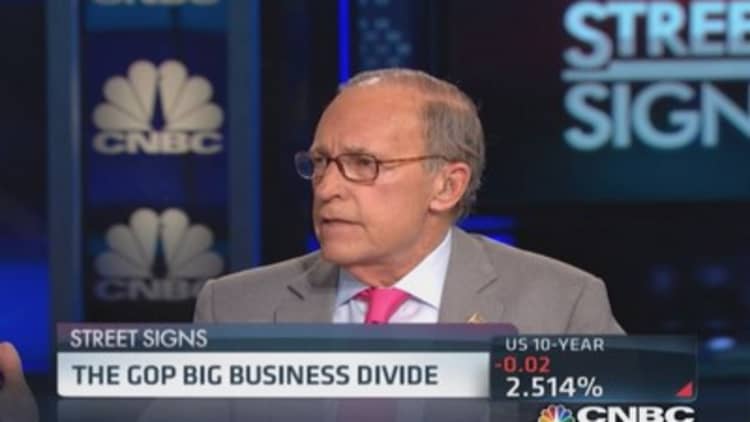This week Sen. Mike Johanns, R-Neb., is expected to co-sponsor bipartisan legislation to reauthorize the Export-Import Bank of the U.S., a little-known quasi government agency that has become a political lightning rod in recent weeks, as reported by the Hill. But the bill's passage, he warned, is contingent on Nevada's Democratic leader Harry Reid, allowing amendments on the floor and smooth passage for legislation.
"The bank plays an important role because many foreign governments provide heavy assistance to their nation's exporters, which distorts foreign markets and creates an unfair disadvantage for American exporters," according to Sen. Johanns. More than 60 countries operate similar banks or export credit agencies (ECAs), including China, Germany, Japan and India. They finance or underwrite more than $400 billion of business activity abroad.
That's welcome news for thousands of small and midsize exporters in America that rely on the multilateral lending agency's support to export to markets around the world.
Just ask Musya Tumanyan, senior vice president of Hoffman International, a global construction equipment distributor in Piscataway, New Jersey, which employs nearly 100 workers.
During the depths of the recession, Hoffman International received a disturbing call. In light of the dismal and uncertain economic conditions at the time, the company's private export credit insurance provider was canceling its policy. Without coverage for the purchase orders made by overseas customers, Hoffman was in danger of losing millions of dollars of international sales. "Just when we needed the coverage the most, it was gone," recalled Tumanyan.
[Ex-Im Bank] helps companies get their goods into foreign markets and helps grow our economy here in the U.S.Todd McCrackenpresident of the National Small Business Association
To address the crisis, Hoffman International turned to the Ex-Im Bank—as it's most commonly known—the official export agency of the United States. Its mission: to assist in financing the export of U.S. goods to international markets. The bank does this by offering a variety of services to companies, big and small, including direct loan and loan guarantees to foreign buyers of U.S. goods, working-capital guarantees backed by the federal government, and export-credit insurance used to protect shipments to risky markets. Tumanyan said the Ex-Im Bank was able to step in and offer risk coverage for the company's pending international sales, saving 15 jobs that would have been eliminated had the business been lost.
Now the very existence of the 80-year-old bank, established during the New Deal era of President Franklin D. Roosevelt's administration, is at stake. Its charter expires on September 30 unless Congress acts to renew it—and that's uncertain. New House leadership, chiefly Republican Rep. Jeb Hensarling, chairman of the Financial Services Committee (which has jurisdiction over Ex-Im) and a Tea Party favorite, along with conservative groups have been harshly critical of the bank. They say its services are akin to little more than corporate welfare for some of the country's largest companies, such as Boeing, General Electric and Caterpillar.
Supporters of the bank, including Sen. Johanns and more than 40 Republican members of Congress and the National Association of Manufacturers, counter that it helps all U.S. companies, especially small businesses, better compete with foreign rivals, many of which get plenty of help from their own governments in the form of direct loans and loan guarantees. Further, they say the bank has been reauthorized 16 times over its history, with broad bipartisan support. Criticism of the bank now, they say, is largely a political move.
Read MoreThe bank nobody knows is now a 2014 election lightning rod
Shouldering credit risk in volatile markets
"The Ex-Im Bank is important to smaller companies trying to export more expensive capital goods that need the longer-term financing that the Ex-Im Bank can provide," said Todd McCracken, president of the National Small Business Association (NSBA). "It helps these companies get their goods into foreign markets and helps grow our economy here in the U.S."
Indeed, according to numbers from the Bureau of Labor Statistics, the Ex-Im Bank says it has supported 1.2 million private-sector American jobs since 2009, including 205,000 jobs in 2013 alone. Further, the bank claims it has financed more small-business exports in the last five years than in the previous eight years combined. In fiscal year 2013, nearly 90 percent of Ex-Im Bank's transactions—a record high 3,413, totaling more than $5 billion—were for companies with less than 500 employees. Of those, the bulk were for export credit insurance.
To qualify for Ex-Im small-business support, companies must export goods or services produced with more than 50 percent of U.S. parts and labor.
Ellicott Dredges of Baltimore is among those companies. The nearly 130-year-old firm makes dredges that are used in mining and port infrastructure all over the world. These "floating bulldozers," as company president Peter Bowe calls them, can cost anywhere from $100,000 to $10 million.
"As a piece of capital equipment, it's normal for customers to need financing, because these are big-ticket items," he said. Ellicott's European competitors already offer financing that is comparable to, or better than, what Ex-Im does. Without the bank's services, Bowe said his company would be at a serious disadvantage when negotiating with foreign buyers. "It's like showing up at the dance with one shoe on. It's very awkward," he explained.
Read More

The end result, he adds, would be the loss of a "meaningful" percentage of the company's sales and eventual layoffs. "This would certainly give our non-American competitors a decided advantage over us," Bowe said.
Proponents of a reauthorization also call into question claims made by critics that the bank is costly to taxpayers. During a hearing on the matter in late June, Hensarling was quoted as saying: "So if you're a politically connected bank or company that benefits from Ex-Im, no doubt you would like it to continue. After all, it's a sweetheart deal for you. Taxpayers shoulder the risk, and you get the reward."
Yet according to the bank, over the past five years, it has actually returned more than $2 billion to the U.S. Treasury from the fees and interest it charges for its loans and guarantees. As of March 31, its default rate was less than one-quarter of 1 percent.
As noted by Ex-Im Bank's President and Chairman Fred Hochberg, during his testimony before the House Committee on Financial Services on June 25, "Make no mistake, foreign governments want for themselves the 205,000 American jobs Ex-Im financing helped support last year."
Foreign customers getting jittery
The belief among critics that private-sector banks will step in and provide the same loan guarantees that the Ex-Im Bank currently does is also being challenged. "I don't see a lot of evidence that this would be the case," said McCracken. "Entrepreneurs would have recognized long ago that this was a potential market and would have entered it already and outcompeted the Ex-Im Bank. If they did decide now to enter this market, it would take a long time for things to get established, and in the meantime, these deals wouldn't happen and jobs wouldn't be created."
Tumanyan of Hoffman International said she doesn't have that kind of time. If the Ex-Im Bank is not reauthorized, she believes the company will be forced to shut down its export operations, which in any given year can account for 20 percent or more of sales, and lay off employees.
"I'm already getting calls from foreign customers that have the jitters just because of what they're hearing about the future of the Ex-Im Bank," she said. "They don't want to spend the time putting a deal together with us if, at the end, the financing isn't there. They'll just do business with a company in another country."
—By Susan Caminiti, special to CNBC.com





